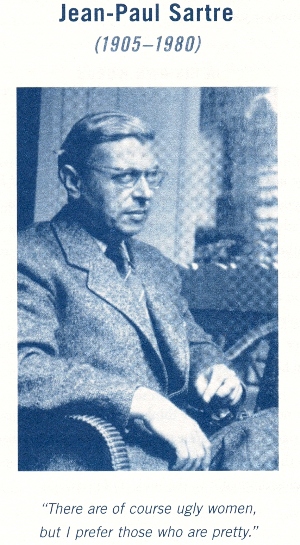 Ký |
  Lẽ dĩ nhiên,
có những bà xấu xa,
nhưng tớ thích những bà xinh đẹp
Ðại triết
gia thất bại trên đường tình Sartre tự đặt
cho mình cái nick, chàng “Don Juan văn học”, a "literary Don Juan",
nhưng thế nhân gọi chàng là thằng khùng mắt lé, a "cross-eyed old
fool." Giai thoại Sartre thấy cua bò trên lưng, Gấu nghe ông anh nhà
thơ kể,
1 lần ngồi Quán Chùa.
Mời độc giả đọc, đích thị lời của anh khùng mắt lé. IN HIS OWN
WORDS Sartre's
Crabs When he was
thirty-two, Jean-Paul Sartre was plagued by a bad case of crabs. As he
told
John Gerassi in 1971:
French
existentialist Jean-Paul Sartre was an unlikely candidate for a
"literary
Don Juan" (as he liked to call himself). The first girl that he became
infatuated with in school rejected him, calling him a "cross-eyed old
fool." It was an inauspicious introduction to the opposite sex. His
prospects did not look any more promising as an adult: He stood just
five-foot-one, dressed in oversized clothes, and had no concept of
personal
hygiene. Sartre
miraculously overcame these deficiencies by simply ignoring them and
projecting
an aura of confidence. He admitted that, as a youth, "[1] was very
melancholy because I was ugly and that made me suffer. I have
absolutely rid
myself of that, because it's a weakness." He only needed one thing to
seduce
women: les mots ("his words"). He lost his
virginity at the age of eighteen to an older married woman. "I did it
with
no great enthusiasm," he said, "because she wasn't very pretty."
It was okay for him to be ugly, but Sartre held the women he slept with
to a
higher standard. In a similar vein, he felt no respect for prostitutes
because
"a girl shouldn't give herself like that" ... yet he regularly
visited brothels with his university friends. When Sartre
was twenty-one, he fell in love with Germaine Marron and requested her
hand in
marriage. Her parents originally consented but called the wedding off
when
Sartre failed his teaching exam in the summer of 1928. "I was
relieved," Sartre wrote. ''I'm not sure of having acted quite correctly
in
this whole affair." In fact, he
had not been acting "correctly" during his engagement: He had been
having an affair with Simone Jollivet, a playwright and actress who
lived in
the nearby city of Toulouse. When Sartre presented Jollivet with a
bottle of
perfume, he was miffed that she placed it on her nightstand beside four
other
bottles from four other lovers. "What? Do you own me?" she said
angrily. "Am I supposed to sit here and wait for your occasional
appearances [in Toulouse]?" After thinking it over,
Sartre agreed with her. "She was right, of course, and I knew it. I
concluded that jealousy is
possessiveness. Therefore, I decided
never to be jealous again." In 1929,
while studying for his second attempt at his teaching certification,
Sartre met
a fellow philosophy student who shared his values: Simone de Beauvoir.
The long
and winding road from their meeting to their burial in a shared
Parisian grave
is recounted earlier in this book (page 31), but suffice it to say that
the
open nature of their relationship allowed Sartre the freedom to sleep
around as
he pleased. His burgeoning literary fame - as a playwright, novelist,
screenwriter, and critic-guaranteed him a constant stream of young
ladies who
were eager to make his acquaintance. Sartre's
love life was not without drama. He often saw several different women
concurrently, booking them into separate slots in his busy schedule.
(It's
amazing that he ever found the time to write.) The details of his
various
liaisons is dizzying, but here's a taste from Hazel Rowley's
Sartre-Beauvoir
biography Tête-à-Tête: His women
all lived within ten minutes of him; they rarely saw one another, and
none of
them knew the truth about his life. Arlette had no idea that after
going for
three weeks' vacation every year with her, Sartre went away with Wanda
for two
or three weeks. Wanda did not know that Sartre still saw Michelle. When
he slept
at Beauvoir's, he told Wanda he was sleeping at home. His letters to
Wanda were
filled with outrageous inventions. He'd be late back to Paris, he once
told
her. He was locked up in a castle in Austria. He continued
to live out his promiscuous dream right up until the end of his life.
In 1979,
at the age of seventy-four, a toothless and blind Sartre remarked to
one of his
girlfriends that, not counting Beauvoir and her girlfriend Sylvie Le
Bon,
"there are nine women in my life at the moment!" Not a bad ending for
a "cross-eyed old fool." IN HIS OWN
WORDS Sartre's
Crabs When he was
thirty-two, Jean-Paul Sartre was plagued by a bad case of crabs. As he
told
John Gerassi in 1971: After I took
mescaline, I started seeing crabs around me all the time. [Three or
four of
them] followed me in the streets, into class. I got used to them. I
would wake
up in the morning and say, "Good morning, my little ones, how did you
sleep?" I would talk to them all the time. I would say, "Okay, guys,
we're going into class now, so we have to be still and quiet," and they
would be there, around my desk, absolutely still, until the bell rang
.... The
crabs stayed with me until the day I simply decided that they bored me
and that
I just wouldn't pay attention to them.
|